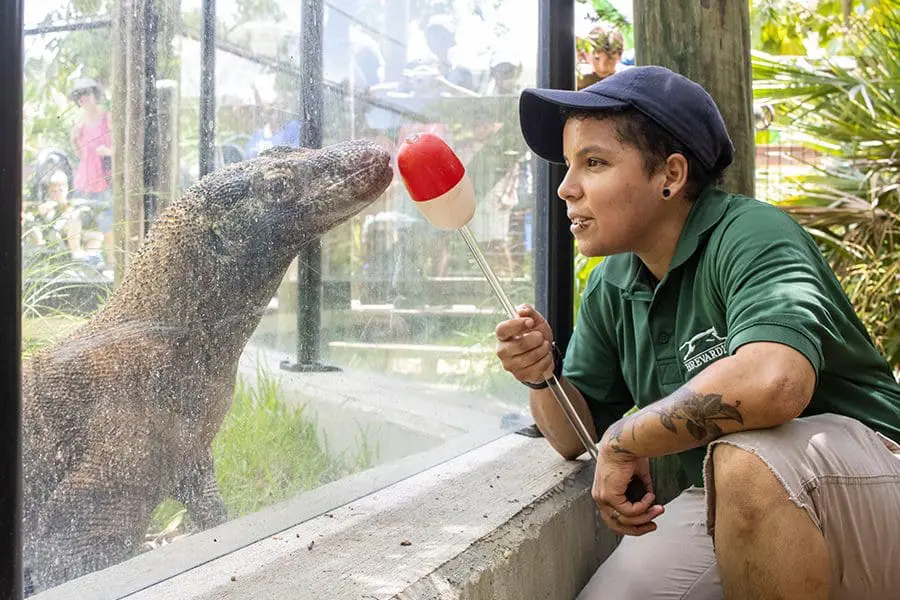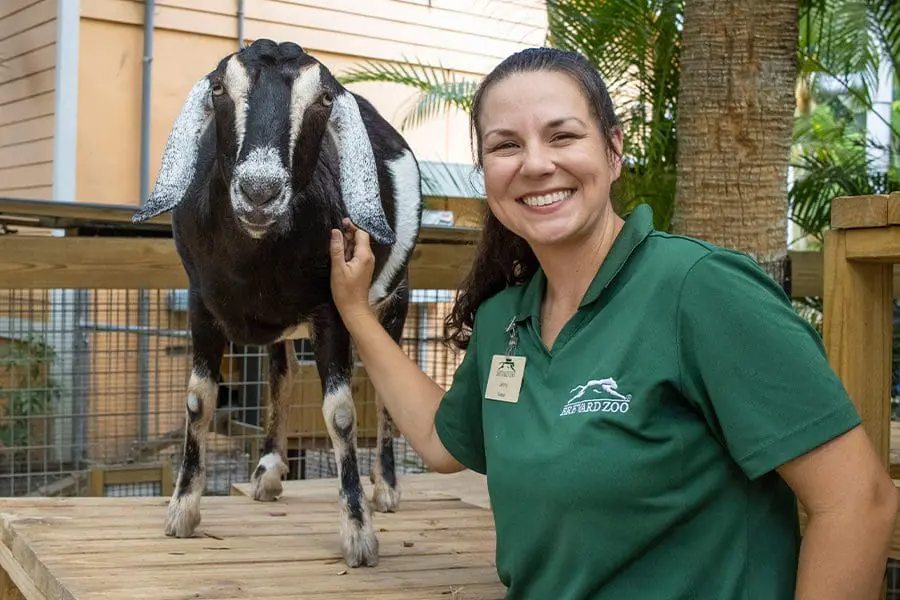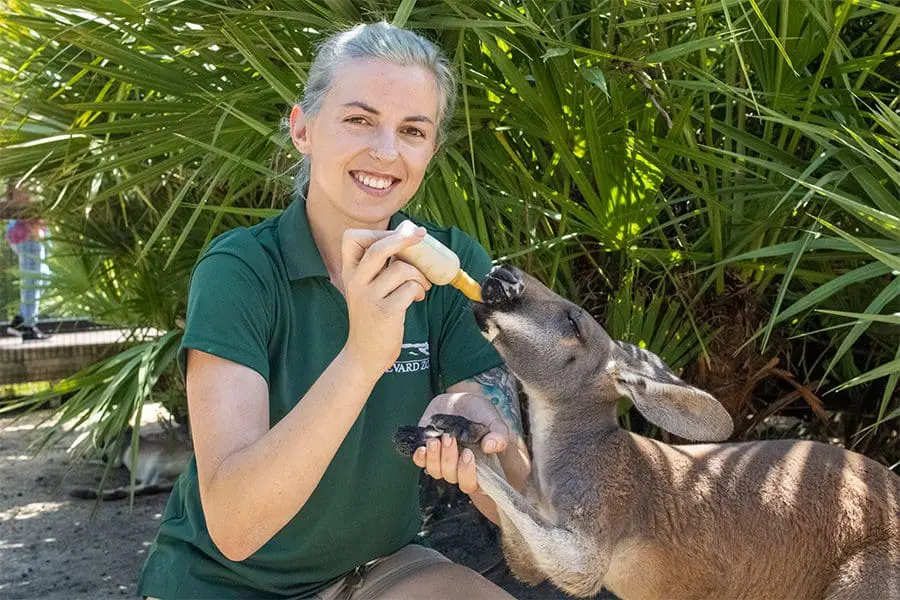

Ready for a snack! When he touches his target, komodo dragon Sheldon gets a yummy treat from keeper Danie.
We’re all about the animals, but we can’t do what we do without our keepers, who work tirelessly to ensure all of the living creatures in our care are thriving.
Over the past year, a group of employees has spearheaded a diversity, equity, inclusion and accessibility (DEIA) committee to invoke positive change within the Zoo and our community as a whole. This year, we’re commemorating National Zookeeper Week (July 18–24) by taking a moment to celebrate the exceptional qualities of our animal staff. Follow along as we highlight a few of our amazing keepers who represent the diverse and inclusive culture that we strive to support.

Name: Danie Ramos
Pronouns: She/He/They
Position: Herps and Aquatics Keeper
Been with the Zoo since: June 2019
About the keeper: Danie identifies as a transgendered Hispanic person and has been loving “zookeeper life” for nearly seven years. While she loves working with reptiles and amphibians, they began their zoological career as a mammal keeper. Danie particularly has a passion for rodents—so much so that he has a white-footed mouse tattoo on his arm! Apart from her zeal for animals, Danie has a passion for DEIA issues and cultural storytelling. They come from a 50/50 Mexican and Puerto Rican family and have relatives still living in those areas. As part of his anthropology degree, Danie researched Mesoamerican civilizations and was able to find their own family ties to the Aztec and Taino people. She can even read Mayan hieroglyphics! Their wife is a British immigrant, who adds yet another layer to Danie’s cultural history. His love for different cultures and stories has recently intertwined with the animals she cares for as San stories from Sub-Saharan Africa recently inspired them to name the Zoo’s young rock python Tsodilo.

Name: Jenny Ryan
Pronouns: She/Her
Position: Animal Keeper III (Barnyard/Ambassador)
Been with the Zoo since: February 2016
About the keeper: Jenny first joined the Zoo as a volunteer in 1999 and went on to work in education, adventure services and animal care from 2001 to 2008. After leaving the Zoo to start a family and pursue other career paths, Jenny found her way back in 2016 when her youngest child began kindergarten. Some of her favorite animals to work with are Rosie the alpaca and Beni the blue-throated macaw. What makes Jenny diverse is that she was diagnosed with epilepsy in her early 20’s. Epilepsy is a neurological disorder in which abnormal electrical activity in the brain can trigger seizures. Though medical treatments can help control the symptoms, the condition has no known cure. While some seizures cause a person to temporarily “zone out,” Jenny experiences ones that result in loss of consciousness, convulsions and memory loss. Jenny considers herself lucky to experience something called an “aura” before the onset of a seizure, which acts as a warning and allows her to stop what she is doing and get to a safe place. When Jenny is not at the Zoo, she enjoys kayaking, riding roller coasters, cooking vegetarian meals and spending time with her fiancé Matt, who is also an employee at the Zoo.

Name: Alyssa Padmos
Pronouns: She/Her
Position: Lands of Change: Australia and Beyond Keeper
Been with the Zoo since: May 2018
About the keeper: Alyssa has always been surrounded by animals and was lucky enough to have parents who supported any opportunity she had to gain valuable experience in her field. Their unwavering support continued when they noticed something strange about Alyssa’s eyesight. Although she had always worn glasses, it became obvious that her prescriptions weren’t strong enough. After being recommended to a local retinal specialist and going through rigorous testing, Alyssa was told that she has Stargardt’s disease, meaning she was losing her eyesight from a juvenile form of macular degeneration. Doctors told her that she wouldn’t be able to go to college, pursue a career in zoology or even use normal transportation. Not only is Stargardt’s disease caused by a rare genetic mutation, Alyssa has two mutations, which makes her condition more rare and aggressive. After a thorough investigation, she found that the leading researcher for the disease lived just 30 minutes away, whose team provided her with the tools she needed to succeed. In addition to getting into her top choice for higher education, Alyssa has also received lifelong resources such as learning how to use a cane and being fitted for special driving glasses. With persistence, determination and the support of special people in her life, Alyssa is now a high-functioning visually impaired individual. She notes that the Zoo has provided a safe space for her to succeed and she loves being a part of this extra-special work environment.
We couldn’t be prouder of all of the zookeepers that dedicate their careers to caring for our animals. On your next visit to the Zoo, be sure to stop and thank a keeper for their hard work!
